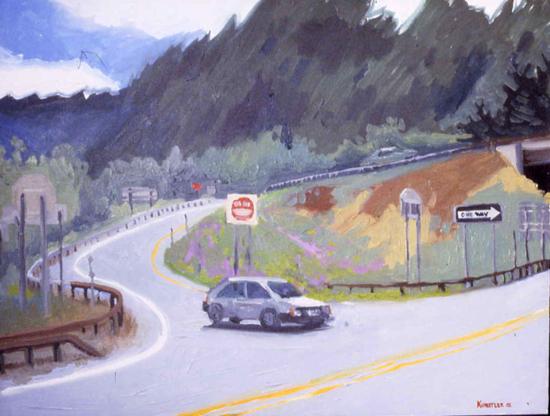
James Howard Kunstler, "Off-ramp at Exit 29 of Interstate 87"
James Howard Kunstler -- World News Trust
Mar. 8, 2010 -- I was plying the interstate highways of New England this weekend -- there is no sane way to get from Albany, New York, to the vicinity of Middletown, Connecticut, by public transit -- marveling at the vistas of normality all around me: the freeway lanes with their orderly streams of happy motorists, the chain stores floating like islands on the gray undulating landscape, the corporate towers of Springfield, Mass, and then Hartford, gleaming in the persistent pre-spring sunshine, as though they physically represented the wished-for dynamism of economies in recovery. "I see dead people..." said the kid in that horror movie. I see dying ways of life.
There was no denying the spectacular weather for us long-suffering northeasterners. A week ago, it was like living in a banana daiquiri around here. Now, it was sixty-two degrees in East Haddam, CT, along a very beautiful stretch of the Connecticut River somehow miraculously unmarred by the usual mutilations of industry or recreation. On a few hillsides facing south, daffodils were already up with blossom heads ready to pop. The mind could go two ways: into the past, when wooden sailing craft were built in yards along the river; or into the future, when it would be easy to imagine wooden sailing craft being built there again, only twenty miles or so from the great sheltered mini-sea of Long Island Sound.
Whatever else one thinks of how we live these days, it's hard to not see it as temporary, historically anomalous, a peculiar blip in human experience. I've spent my whole life riding around in cars, never questioning whether the makings of tomorrow's supper would be there waiting on the supermarket shelves, never doubting when I entered a room that the lights would go on at the flick of a switch, never worrying about my personal safety. And now hardly a moment goes by when I don't feel tremors of massive change in these things, as though all life's comforts and structural certainties rested on a groaning fault line.
It had been one of those eventless weeks when the world pretended to be a settled place. The collapse of Greece seemed like little more than a passing case of geo-financial heartburn. The 36,000-odd newly-unemployed were spun magically into a feel-good story for public consumption, and the stock markets ratified it by levitating over a hundred points. The news media was preoccupied with the Great Question of whether the first woman film director would win a prize, thus settling all accounts in the age-old gender war, and the health care reform bill lumbered around the congressional offices like a zombie in search of a silver bullet that might send it back to the comforts of the tomb.
more
http://worldnewstrust.com/index.php?option=com_flexicontent&view=items&cid=113:wnt-flatwire&id=7576:then-all-at-once-james-howard-kunstler